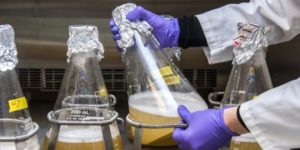APPLICATIONS OF TECHNOLOGY:
- Efficient conversion of lignocellulosic biomass into advanced and sustainable fuels and chemicals
BENEFITS:
- Lowers the cost of converting lignocellulosic feedstocks to sustainable fuels and chemicals by increasing host utilization of xylose and galactose sugars
- Bioengineering does not use plasmids and maintains a high growth rate
BACKGROUND:
Pseudomonas putida KT2440 (KT2440) has been widely studied for use as a microbial platform in biorefinery processes due to its tolerance to various stresses and the ability to grow on biomass-abundant aromatics. To enable xylose and galactose utilization, KT2440 has previously been engineered by the heterologous introduction of known sugar utilization pathways. However, the resulting strains show insufficient C5 sugar utilization and inhibited cell growth. Therefore, further studies to construct less-explored pathways in KT2440 were warranted.
TECHNOLOGY OVERVIEW:
Researchers at JBEI and UC San Diego have engineered KT2440 for efficient utilization of xylose and galactose by the introduction of heterologous pathways and adaptive laboratory evolution to optimize its performance.
The evolved strains show high growth rates and sugar uptake rates on xylose or galactose supplemented mediums. Specifically, the clones exhibited growth rates of 0.25 h-1 and 0.52 h-1 on xylose and galactose, respectively. Researchers validated the critical roles of the introduced heterologous genes and commonly mutated genes by deleting them in evolved clones. Also, they confirmed their capability to serve as a platform by demonstrating efficient production of indigoidine, a naturally-found blue pigment.
Compared to strains that were reported in the previous studies, researchers can provide cells with higher xylose or galactose utilization capability even without using plasmids or selective markers such as antibiotics. The use of the JBEI KT2440 variation is expected to improve cost-effectiveness of bioprocesses by achieving whole-conversion of biomass-derivable carbon sources.
DEVELOPMENT STAGE: Proven principle
FOR MORE INFORMATION:
https://www.ncbi.nlm.nih.gov/pmc/articles/PMC6927180/
PRINCIPAL INVESTIGATORS:
- Hyungyu Lim, UC San Diego
- Adam M. Feist, UC San Diego
- Thomas Eng, Berkeley Lab
STATUS: Patent pending.
OPPORTUNITIES: Available for licensing or collaborative research.
SEE THESE OTHER BERKELEY LAB TECHNOLOGIES IN THIS FIELD:
A Novel D-Xylose Isomerase for Efficient Lignocellulosic Hydrolysate Fermentation 2019-132
